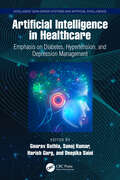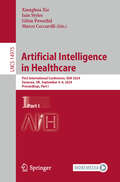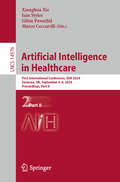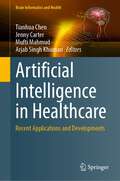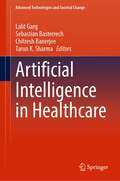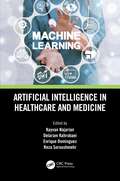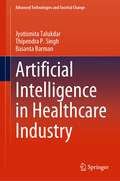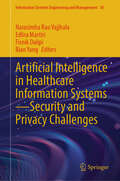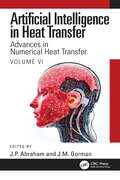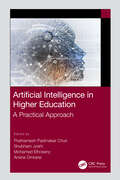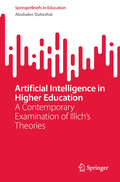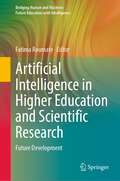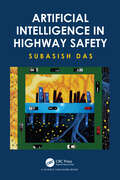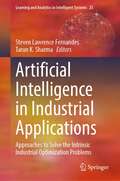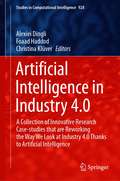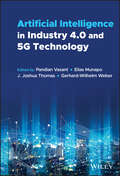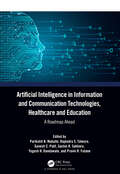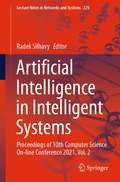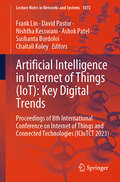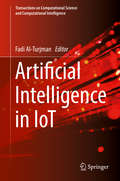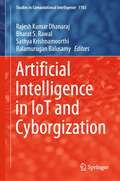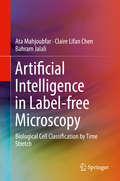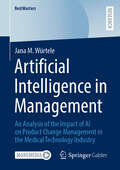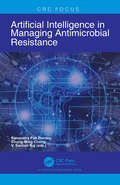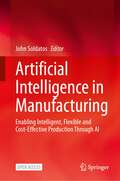- Table View
- List View
Artificial Intelligence in Healthcare: Emphasis on Diabetes, Hypertension, and Depression Management (Intelligent Data-Driven Systems and Artificial Intelligence)
by Gourav Bathla Sanoj Kumar Harish Garg Deepika SainiThis book presents state-of-the-art research works for a better understanding of the advantages and limitations of AI techniques in the field of healthcare. It will further discuss artificial intelligence applications in depression, hypertension and diabetes management. The text also presents an artificial intelligence chatbot for depression, diabetes, and hypertension self-help.This book: Provides a structured overview of recent developments of artificial intelligence applications in the healthcare sector. Presents an in-depth understanding of how artificial intelligence techniques can be applied to diabetes management. Showcases supervised learning techniques based on datasets for depression management. Discusses artificial intelligence chatbot for diabetes, depression, and hypertension self-care. Highlights the importance of artificial intelligence in managing and predicting diabetes, hypertension, and depression. The text is primarily written for senior undergraduate, graduate students, and academic researchers in diverse fields including electrical engineering, electronics and communications engineering, computer science and engineering, and biomedical engineering.
Artificial Intelligence in Healthcare: First International Conference, AIiH 2024, Swansea, UK, September 4–6, 2024, Proceedings, Part I (Lecture Notes in Computer Science #14975)
by Marco Ceccarelli Xianghua Xie Iain Styles Gibin PowathilThe two-volume set LNCS 14975 + 14976 constitutes the proceedings of the First International Conference on Artificial Intelligence in Healthcare, AIiH 2024, which took place in Swansea, UK, in September 2024. The 47 full papers included in the proceedings were carefully reviewed and selected from 70 submissions. They were organized in the following topical sections: Part I: Personalised Healthcare and Medicine; AI driven early diagnosis and prevention; AI driven robotics for healthcare; AI in mental health; Part II: AI in proactive care and intervention; AI-aided medical imaging and analysis; Medical signal and image processing; Assisted living technology; Digital twinning, virtual pathology and oncology; Patient data, privacy and ethics.
Artificial Intelligence in Healthcare: First International Conference, AIiH 2024, Swansea, UK, September 4–6, 2024, Proceedings, Part II (Lecture Notes in Computer Science #14976)
by Marco Ceccarelli Xianghua Xie Iain Styles Gibin PowathilThe two-volume set LNCS 14975 + 14976 constitutes the proceedings of the First International Conference on Artificial Intelligence in Healthcare, AIiH 2024, which took place in Swansea, UK, in September 2024. The 47 full papers included in the proceedings were carefully reviewed and selected from 70 submissions. They were organized in the following topical sections: Part I: Personalised Healthcare and Medicine; AI driven early diagnosis and prevention; AI driven robotics for healthcare; AI in mental health; Part II: AI in proactive care and intervention; AI-aided medical imaging and analysis; Medical signal and image processing; Assisted living technology; Digital twinning, virtual pathology and oncology; Patient data, privacy and ethics.
Artificial Intelligence in Healthcare: Recent Applications and Developments (Brain Informatics and Health)
by Tianhua Chen Jenny Carter Mufti Mahmud Arjab Singh KhumanRecent advances in artificial intelligence (AI) and machine learning have witnessed many successes in various disciplines including the healthcare sector. Innovations in intelligent medical systems have revolutionized the way in which healthcare services are provided, ranging from making clinical diagnosis, developing personalized treatment and drugs, assisting patient monitoring, to automating administrative tasks and reducing operational costs. In this book, the authors present key applications in the general area of health care, where AI has made significant successes. From the individual chapters, the readers will be provided with a range of examples to illustrate the wide plethora of application domains utilizing state-of-the-art AI techniques, proving credence to the versatility and effectiveness of an AI approach in health care and medicine. We envisage that this book is ideal for individuals new to the notion of AI in health care, equally, early career academics who wish to further expand on their knowledge in AI in medicine. What will be presented is in no means an exhaustive list of applications, but most definitely a varied one.
Artificial Intelligence in Healthcare (Advanced Technologies and Societal Change)
by Lalit Garg Sebastian Basterrech Chitresh Banerjee Tarun K. SharmaThis book highlights the analytics and optimization issues in healthcare systems, proposes new approaches, and presents applications of innovative approaches in real facilities. In the past few decades, there has been an exponential rise in the application of swarm intelligence techniques for solving complex and intricate problems arising in healthcare. The versatility of these techniques has made them a favorite among scientists and researchers working in diverse areas. The primary objective of this book is to bring forward thorough, in-depth, and well-focused developments of hybrid variants of swarm intelligence algorithms and their applications in healthcare systems.
Artificial Intelligence in Healthcare and Medicine
by Kayvan NajarianThis book provides a comprehensive overview of the recent developments in clinical decision support systems, precision health, and data science in medicine. The book targets clinical researchers and computational scientists seeking to understand the recent advances of artificial intelligence (AI) in health and medicine. Since AI and its applications are believed to have the potential to revolutionize healthcare and medicine, there is a clear need to explore and investigate the state-of-the-art advancements in the field. This book provides a detailed description of the advancements, challenges, and opportunities of using AI in medical and health applications. Over 10 case studies are included in the book that cover topics related to biomedical image processing, machine learning for healthcare, clinical decision support systems, visualization of high dimensional data, data security and privacy, bioinformatics, and biometrics. The book is intended for clinical researchers and computational scientists seeking to understand the recent advances of AI in health and medicine. Many universities may use the book as a secondary training text. Companies in the healthcare sector can greatly benefit from the case studies covered in the book. Moreover, this book also: Provides an overview of the recent developments in clinical decision support systems, precision health, and data science in medicine Examines the advancements, challenges, and opportunities of using AI in medical and health applications Includes 10 cases for practical application and reference Kayvan Najarian is a Professor in the Department of Computational Medicine and Bioinformatics, Department of Electrical Engineering and Computer Science, and Department of Emergency Medicine at the University of Michigan, Ann Arbor. Delaram Kahrobaei is the University Dean for Research at City University of New York (CUNY), a Professor of Computer Science and Mathematics, Queens College CUNY, and the former Chair of Cyber Security, University of York. Enrique Domínguez is a professor in the Department of Computer Science at the University of Malaga and a member of the Biomedical Research Institute of Malaga. Reza Soroushmehr is a Research Assistant Professor in the Department of Computational Medicine and Bioinformatics and a member of the Michigan Center for Integrative Research in Critical Care, University of Michigan, Ann Arbor.
Artificial Intelligence in Healthcare Industry (Advanced Technologies and Societal Change)
by Jyotismita Talukdar Thipendra P. Singh Basanta BarmanThis book presents a systematic evolution of artificial intelligence (AI), its applications, challenges and solutions in the field of healthcare. The book mainly covers the foundations and various methods of learning in artificial intelligence with its application in healthcare industry. This book provides a comprehensive introduction to data analysis using AI as a tool in the generation, normalization and analysis of healthcare data in association with several evaluation techniques and accuracy measurements. The book is divided into three major sections describing the basic foundations of AI and its associated algorithms, history of artificial intelligence in healthcare, recent developments and several modeling techniques for the same. The last section of the book provides insights into several implementations and methods of evaluation and accuracy prediction for healthcare analysis in AI. Extensive use of data for analysis and prediction using several technologies has transformed the lives of normal people indirectly effecting our process to communicate, learn, work and socialize within the society. Thus, the book also provides an insight into the ethics of AI that is very vital in the process of implementation and evaluation of healthcare data. The book provides an organized analysis to a considerable part of data in a digitized society. In view of this, it covers the theory, methodology, perfection and verification of empirical work for health-related data processing. Particular attention is devoted to in-depth experiments and applications.
Artificial Intelligence in Healthcare Information Systems—Security and Privacy Challenges (Information Systems Engineering and Management #34)
by Narasimha Rao Vajjhala Edlira Martiri Fisnik Dalipi Bian Yang“Artificial Intelligence (AI) in Healthcare Information Systems: Security and Privacy Challenges” offers a deep dive into the integration of AI in healthcare, with a primary focus on addressing the significant security and privacy concerns that arise in this domain. The chapters in this book highlight the transformative potential of AI in diagnosing and predicting diseases, as well as its impact on fields like fetal medicine, but places special emphasis on the need for robust encryption, data protection techniques, and ethical considerations to safeguard sensitive healthcare data. The book also explores global case studies, from India to Kazakhstan, outlining the challenges and prospects of AI adoption in diverse healthcare settings. Readers will gain insights into AI's role in improving patient outcomes while navigating the complexities of data privacy and security. The book is a valuable resource for healthcare professionals, technologists, and policymakers who are focused on implementing AI-driven solutions securely and ethically in healthcare systems.
Artificial Intelligence in Heat Transfer: Advances in Numerical Heat Transfer Volume VI
by J. M. Gorman J. P. AbrahamArtificial Intelligence in Heat Transfer shows how artificial intelligence (AI) tools and techniques, such as artificial neural networks, machine learning algorithms, genetic algorithms, etc., provide practical benefits specific to thermal sciences. It presents case studies involving heat and mass transfer, multi-objective optimization, conjugate heat transfer, nanofluids, thermal radiation, heat transfer through porous media (metal foam), and more.Drawing on the collective expertise of leading researchers and experts in multiple fields, the book provides an in-depth understanding of the possibilities that emerge when these tools are applied to problems related to thermal sciences. AI is an ever-evolving discipline that has created new and groundbreaking opportunities to advance the mechanical engineering field, particularly in the area of numerical heat transfer. This volume, Advances in Numerical Heat Transfer, explores various ways AI is used in heat transfer to solve engineering problems.This book will serve as an important resource for upper-level undergraduate students, researchers, engineers, and professionals, equipping them with the knowledge and inspiration to push the boundaries of the thermal sciences through AI-driven tools and techniques.
Artificial Intelligence in Higher Education: A Practical Approach
by Prathamesh Churi Shubham Joshi Mohamed Elhoseny Amina OmraneThe global adoption of technology in education is transforming the way we teach and learn. Artificial Intelligence is one of the disruptive techniques to customize the experience of different learning groups, teachers, and tutors. This book offers knowledge in intelligent teaching/learning systems, and advances in e-learning and assessment systems.
Artificial Intelligence in Higher Education: A Contemporary Examination of Illich's Theories (SpringerBriefs in Education)
by Abubaker QutieshatThis book is multi-dimensional exploration of Ivan Illich's critique of institutionalized education. It dissects, analyzes, and understands the implications of his critique for the future of education in a world increasingly influenced by technology, particularly artificial intelligence (AI). The book outlines the problems with current educational systems and discusses potential alternatives, considering the role of modern technology like AI. It employs a multi-disciplinary approach, incorporating historical analysis, philosophical inquiry, and practical considerations to explore Illich's critique. Readers will be equipped with the knowledge to critically assess the educational landscape and consider viable alternatives for reform. This book contributes to the field of educational theory and practice in its nuanced understanding of Illich's critique and its implications for educational reform. It serves as both a theoretical exploration and a practical guide, making it a valuable resource for a wide range of readers, including educators, policymakers, students, and anyone interested in the future of education.
Artificial Intelligence in Higher Education and Scientific Research: Future Development (Bridging Human and Machine: Future Education with Intelligence)
by Fatima RoumateThis book explains the interaction between artificial intelligence and higher education. It explores artificial intelligence’s tangible and intangible impact on higher education and scientific research and discusses how higher education and scientific research enhance the progress of artificial intelligence technologies. Based on systematic analysis with a multidisciplinary approach and a combination of theory and practice, the book brings original perspectives from the massive use of artificial intelligence in higher education and scientific research since the appearance of COVID-19. This book also discusses ethics in artificial intelligence, taking into consideration the recommendation on ethics of artificial intelligence adopted by UNESCO. This book explains the importance of technological sovereignty and new strategies to face current and future challenges related to e-learning, deep learning, and machine learning.
Artificial Intelligence in Highway Safety
by Subasish DasArtificial Intelligence in Highway Safety provides cutting-edge advances in highway safety using AI. The author is a highway safety expert. He pursues highway safety within its contexts, while drawing attention to the predictive powers of AI techniques in solving complex problems for safety improvement. This book provides both theoretical and practical aspects of highway safety. Each chapter contains theory and its contexts in plain language with several real-life examples. It is suitable for anyone interested in highway safety and AI and it provides an illuminating and accessible introduction to this fast-growing research trend. Material supplementing the book can be found at https://github.com/subasish/AI_in_HighwaySafety. It offers a variety of supplemental materials, including data sets and R codes.
Artificial Intelligence in Industrial Applications: Approaches to Solve the Intrinsic Industrial Optimization Problems (Learning and Analytics in Intelligent Systems #25)
by Steven Lawrence Fernandes Tarun K. SharmaThis book highlights the analytics and optimization issues in industry, to propose new approaches, and to present applications of innovative approaches in real facilities. In the past few decades there has been an exponential rise in the application of artificial intelligence for solving complex and intricate problems arising in industrial domain. The versatility of these techniques have made them a favorite among scientists and researchers working in diverse areas. The book is edited to serve a broad readership, including computer scientists, medical professionals, and mathematicians interested in studying computational intelligence and their applications. It will also be helpful for researchers, graduate and undergraduate students with an interest in the fields of Artificial Intelligence and Industrial problems. This book will be a useful resource for researchers, academicians as well as professionals interested in the highly interdisciplinary field of Artificial Intelligence.
Artificial Intelligence in Industry 4.0: A Collection of Innovative Research Case-studies that are Reworking the Way We Look at Industry 4.0 Thanks to Artificial Intelligence (Studies in Computational Intelligence #928)
by Alexiei Dingli Foaad Haddod Christina KlüverThis book is intended to help management and other interested parties such as engineers, to understand the state of the art when it comes to the intersection between AI and Industry 4.0 and get them to realise the huge possibilities which can be unleashed by the intersection of these two fields. We have heard a lot about Industry 4.0, but most of the time, it focuses mainly on automation. In this book, the authors are going a step further by exploring advanced applications of Artificial Intelligence (AI) techniques, ranging from the use of deep learning algorithms in order to make predictions, up to an implementation of a full-blown Digital Triplet system. The scope of the book is to showcase what is currently brewing in the labs with the hope of migrating these technologies towards the factory floors. Chairpersons and CEOs must read these papers if they want to stay at the forefront of the game, ahead of their competition, while also saving huge sums of money in the process.
Artificial Intelligence in Industry 4.0 and 5G Technology
by Pandian Vasant Elias Munapo J. Joshua Thomas Gerhard-Wilhelm WeberArtificial Intelligence in Industry 4.0 and 5G Technology Explores innovative and value-added solutions for application problems in the commercial, business, and industry sectors As the pace of Artificial Intelligence (AI) technology innovation continues to accelerate, identifying the appropriate AI capabilities to embed in key decision processes has never been more critical to establishing competitive advantage. New and emerging analytics tools and technologies can be configured to optimize business value, change how an organization gains insights, and significantly improve the decision-making process across the enterprise. Artificial Intelligence in Industry 4.0 and 5G Technology helps readers solve real-world technological engineering optimization problems using evolutionary and swarm intelligence, mathematical programming, multi-objective optimization, and other cutting-edge intelligent optimization methods. Contributions from leading experts in the field present original research on both the theoretical and practical aspects of implementing new AI techniques in a variety of sectors, including Big Data analytics, smart manufacturing, renewable energy, smart cities, robotics, and the Internet of Things (IoT). Presents detailed information on meta-heuristic applications with a focus on technology and engineering sectors such as smart manufacturing, smart production, innovative cities, and 5G networks. Offers insights into the use of metaheuristic strategies to solve optimization problems in business, economics, finance, and industry where uncertainty is a factor. Provides guidance on implementing metaheuristics in different applications and hybrid technological systems. Describes various AI approaches utilizing hybrid meta-heuristics optimization algorithms, including meta-search engines for innovative research and hyper-heuristics algorithms for performance measurement. Artificial Intelligence in Industry 4.0 and 5G Technology is a valuable resource for IT specialists, industry professionals, managers and executives, researchers, scientists, engineers, and advanced students an up-to-date reference to innovative computing, uncertainty management, and optimization approaches.
Artificial Intelligence in Information and Communication Technologies, Healthcare and Education: A Roadmap Ahead
by Parikshit N. Mahalle Rajendra S. Talware Ganesh C. Patil Sachin R. Sakhare Yogesh H. Dandawate Pravin R. FutaneArtificial Intelligence in Information and Communication Technologies, Healthcare and Education: A Roadmap Ahead is designed as a reference text and discusses inter-dependability, communication and effective control for the betterment of services through artificial intelligence (AI), as well as the challenges and path ahead for AI in computing and control across different domains of business and human life. The book accommodates technologies and application domains including backbone hardware, systems and methods for deployment, which help incorporating intelligence through different supervised and probabilistic learning approaches. Features The book attempts to establish a connection between hardware, software technologies and algorithmic intelligence for data analysis and decision support in domains such as healthcare, education and other aspects of business and mobility. It presents various recent applications of artificial intelligence in information and communication technologies such as search and optimization methods, machine learning, data representation and ontologies, and multi-agent systems. The book provides a collection of different case studies with experimentation results than mere theoretical and generalized approaches. Covers most of the applications using the trending technologies like machine learning (ML), data science (DS), Internet of Things (IoT), and underlying information and communication technologies. The book is aimed primarily at advanced undergraduates and postgraduate students studying computer science, computer applications, and information technology. Researchers and professionals will also find this book useful.
Artificial Intelligence in Intelligent Systems: Proceedings of 10th Computer Science On-line Conference 2021, Vol. 2 (Lecture Notes in Networks and Systems #229)
by Radek SilhavyThis book constitutes the refereed proceedings of the artificial intelligence in intelligent systems section of the 10th Computer Science Online Conference 2021 (CSOC 2021), held online in April 2021. Artificial intelligence in intelligent systems topics are presented in this book. Modern hybrid and bio-inspired algorithms and their application are discussed in selected papers.
Artificial Intelligence in Internet of Things: Proceedings of 8th International Conference on Internet of Things and Connected Technologies (ICIoTCT 2023) (Lecture Notes in Networks and Systems #1072)
by Frank Lin David Pastor Nishtha Kesswani Ashok Patel Sushanta Bordoloi Chaitali KoleyThis book is a collection of high-quality research papers presented at 8th International Conference on Internet of Things and Connected Technologies (ICIoTCT 2023), held at National Institute of Technology (NIT), Mizoram, India, during 29–30 September 2023. This book presents recent advances on IoT and connected technologies. This book is designed for marketing managers, business professionals, researchers, academicians, and graduate-level students seeking to learn how IoT and connecting technologies increase the amount of data gained through devices, enhance customer experience, and widen the scope of IoT analytics in enhancing customer marketing outcomes.
Artificial Intelligence in IoT (Transactions on Computational Science and Computational Intelligence)
by Fadi Al-TurjmanThis book provides an insight into IoT intelligence in terms of applications and algorithmic challenges. The book is dedicated to addressing the major challenges in realizing the artificial intelligence in IoT-based applications including challenges that vary from cost and energy efficiency to availability to service quality in multidisciplinary fashion. The aim of this book is hence to focus on both the algorithmic and practical parts of the artificial intelligence approaches in IoT applications that are enabled and supported by wireless sensor networks and cellular networks. Targeted readers are from varying disciplines who are interested in implementing the smart planet/environments vision via intelligent wireless/wired enabling technologies.Includes the most up-to-date research and applications related to IoT artificial intelligence (AI);Provides new and innovative operational ideas regarding the IoT artificial intelligence that help advance the telecommunications industry;Presents AI challenges facing the IoT scientists and provides potential ways to solve them in critical daily life issues.
Artificial Intelligence in IoT and Cyborgization (Studies in Computational Intelligence #1103)
by Rajesh Kumar Dhanaraj Bharat S. Rawal Sathya Krishnamoorthi Balamurugan BalusamyThis book introduces the concept of combining artificial intelligence (AI) and Internet of things (IoT) with real human organs to form a cybernetic organism or cyborg. It is a concept of man–machine mixture which helps in restoring or enhancing the ability of a body part by integrating some technology or artificial component with that body part. These smart artificial organs act as a substitute for real organs having various capabilities like scanning the body, detecting and transmitting the diagnostic data to machines. For example, an artificial heart is capable of monitoring the overall health of a person, and lungs can inform the doctor of abnormalities. This book benefits academic researchers and industrialist who work in the field cyborgization and IoT within human bodies.
Artificial Intelligence in Label-free Microscopy: Biological Cell Classification by Time Stretch
by Ata Mahjoubfar Claire Lifan Chen Bahram JalaliThis book introduces time-stretch quantitative phase imaging (TS-QPI), a high-throughput label-free imaging flow cytometer developed for big data acquisition and analysis in phenotypic screening. TS-QPI is able to capture quantitative optical phase and intensity images simultaneously, enabling high-content cell analysis, cancer diagnostics, personalized genomics, and drug development. The authors also demonstrate a complete machine learning pipeline that performs optical phase measurement, image processing, feature extraction, and classification, enabling high-throughput quantitative imaging that achieves record high accuracy in label -free cellular phenotypic screening and opens up a new path to data-driven diagnosis.
Artificial Intelligence in Management: An Analysis of the Impact of AI on Product Change Management in the Medical Technology Industry (BestMasters)
by Jana M. WürteleIn an era of constant global change, companies are challenged to adapt quickly to evolving consumer demands and technological innovations. However, the complexity of product changes in the medical technology industry is particularly high. Leveraging expertise of interview partners from Germany, Switzerland, Liechtenstein, and India, this book examines the perception of digital transformation within the medical technology industry and the increasing prominence of artificial intelligence as a transformative force. Thus, it provides a critical analysis of the potential opportunities for optimization and risks of integrating this technology into product change management in this sector, offering a comprehensive perspective for management practice.
Artificial Intelligence in Managing Antimicrobial Resistance
by Ramendra Pati Pandey Chung-Ming Chang V. Samuel RajThis volume reviews the use of machine learning (ML) to predict antibiotic resistance in pathogens based on gene content and genome composition as data sets comprising hundreds or thousands of pathogen genomes become available. One of the main goals of this work is to promote the use of ML in front-line contexts while simultaneously emphasizing the additional improvements that are required to use these techniques in a secure and confident manner. Given the variety of quantitative and qualitative laboratory indicators of AMR, the issue of what to anticipate is not an easy one.This book is intended for academia, students of medical science, microbiology, biology, and biotechnology, as well as experts and scientists working in the fields of infectious diseases, government health organizations, and medicine.
Artificial Intelligence in Manufacturing: Enabling Intelligent, Flexible and Cost-Effective Production Through AI
by John SoldatosThis open access book presents a rich set of innovative solutions for artificial intelligence (AI) in manufacturing. The various chapters of the book provide a broad coverage of AI systems for state of the art flexible production lines including both cyber-physical production systems (Industry 4.0) and emerging trustworthy and human-centered manufacturing systems (Industry 5.0). From a technology perspective, the book addresses a wide range of AI paradigms such as deep learning, reinforcement learning, active learning, agent-based systems, explainable AI, industrial robots, and AI-based digital twins. Emphasis is put on system architectures and technologies that foster human-AI collaboration based on trusted interactions between workers and AI systems. From a manufacturing applications perspective, the book illustrates the deployment of these AI paradigms in a variety of use cases spanning production planning, quality control, anomaly detection, metrology, workers’ training, supply chain management, as well as various production optimization scenarios. This is an open access book.
